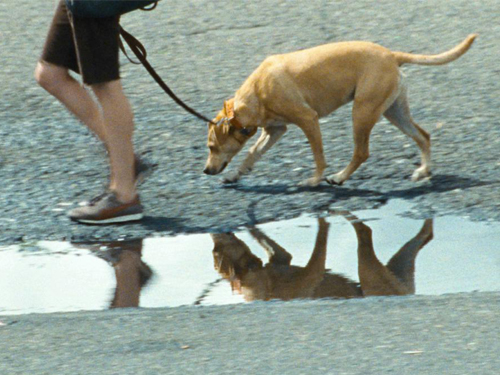
Wendy is on her way to Alaska with her dog Lucy in the hope of finding work there, when her car breaks down in the small town in Oregon. She's broke and steals dog food for Lucy during the delay. Then it goes wrong: Wendy is arrested and when she is released later that day, Lucy has disappeared. In her attempts to find her dog, Wendy has to depend on the helpfulness of strangers.
“Nergens ter wereld kunnen de treinen zo hartverscheurend huilen als de goederentreinen in Amerika. Je hoort ze in de verte. Ze gaan naar de verte. Lang voordat ze passeren daveren ze al als spooktreinen over de lege rails en zingen een klaagzang over een land dat z’n dromen over treinsporen van de ene naar de andere oceaan exporteert. En als je heel goed luistert, te midden van al dat gedreun en gedender, hoor je de stemmen van de hobo’s, de bedelaars, de zwervers, de dagloners, die van de ene vrachtwagon op de andere springen, de droom over het spoorwegnet achtervolgend. Het verhaal van die hobo’s is de alternatieve geschiedenis van Amerika, van de Grote Depressie, van mannen die van de ene op de andere dag niets meer hadden en hoopten dat er achter de horizon wel iets voor ze was. Werk. Water. Een kindhearted woman. Elke keer als in Wendy and Lucy een vrachttrein fluit, hoor je de echo van dat verhaal. Alleen is het nu een meisje dat op reis is, in deze tot stilstand gekomen roadmovie.”
Dana Linssen1
“The most expressive, most heartbreaking moment in Wendy and Lucy involves a small sum of money changing hands, a gesture that encapsulates both Ms. Reichardt’s humanism and her unsentimental sense of economic reality. Whatever big dreams may be driving Wendy, her mind is necessarily focused on dollars and cents.
Her plan is to find work in a fish cannery, maybe in Ketchikan. “I hear they need people up there,” she says. It’s a plain and practical statement that is also terribly sad in its implications. Apart from Lucy, there may not be anyone else who needs or wants Wendy.”
A.O. Scott2
“Reichardt has described her films as “just glimpses of people passing through”. The young woman stranded in small-town Oregon in search for her lost dog passes through “pure optical and sound situations” in which the character doesn’t know how to adequately respond and instead becomes a witness to time passing. She sets out on a directionless Deleuzian “stationary voyage” through the “any-space-whatever” of a former industrial town that has yielded to wear and ennui, a bland and fleeting world where a lasting connection can apparently only be found in the company of animals.”
Stoffel Debuysere3
- 1Dana Linssen, “Wat als je niets meer hebt?”, 2009, de Filmkrant.
- 2A.O. Scott, “This (New) American Life”, 2008, The New York Times.
- 3Stoffel Debuysere, “Prisma #12”, 2016, Sabzian.

